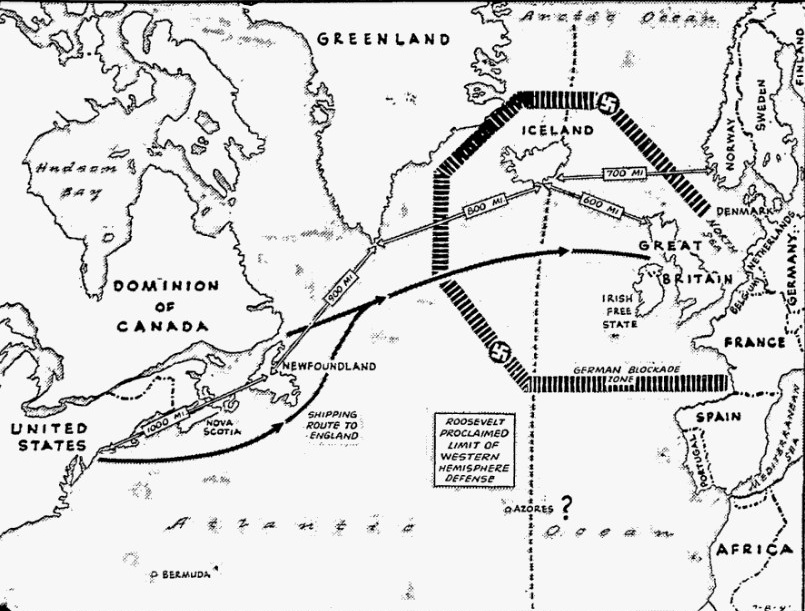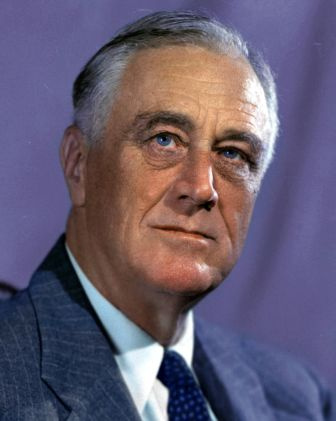The Pittsburgh Press (July 8, 1941)
U.S. BLOCKS ATTACK ON ICELAND
Navy will keep sea lanes open for British ships
…
Armed forces already on island to relieve British ‘guard;’ isolationists critical
…
By Lyle C. Wilson, United Press staff writer

President Roosevelt’s announcement that United States naval forces have moved into Iceland to relieve British Imperial troops on guard in the island republic against German threats of attack, extends the American sphere of influence far out into the Axis-proclaimed blockade zone of the North Atlantic. Of equal importance to forestalling threats of German attacks on the strategic island is President Roosevelt’s avowed intention of using the Navy to keep shipping lanes open to insure a steady flow of war materials to Britain. The move into Iceland is expected to free many British warships from the North Atlantic for duty elsewhere, giving American naval protection to shipping for two-thirds the distance from America to the British Isles. President Roosevelt’s move, hailed as all important by the British, raises a question mark over possible similar action in regard to the vital Azores.
Washington, July 8 –
President Roosevelt took over the military protection of Iceland after reports reached him that the German general staff was considering attacking it to obtain a base from which to control North Atlantic shipping lanes, a usually well-informed Congressional source said today.
United States naval forces were gradually supplanting a British garrison defending the independent island republic which is 180 miles from Greenland, 700 miles from the Norwegian wing of Germany’s war front, and 2,500 miles from New York.
It was a partial fulfillment of President Roosevelt’s fears that all the Atlantic outposts of the Western Hemisphere, including the Azores and the Cape Verde Islands, would have to be taken over as defensive measures.
Nazis plan base at Dakar
The report of German plans said to have reached Mr. Roosevelt also said that the Germans planned another strong base at Dakar, French West Africa, and from it and Iceland hoped to sink or capture 80% of the Atlantic shipping en route to Egypt and the British Isles.
There was no indication here, nor is it believed likely, that the United States would attempt to put a protective force in Dakar.
One reason advanced by Mr. Roosevelt for taking over in Iceland was that German occupation of the island would be:
…a threat against the steady flow of munitions to Great Britain – which is a matter of broad policy clearly approved by Congress.
Attack less likely
The British occupied Iceland a month after the Germans occupied its sister country, Denmark, in the spring of 1940, and have released various photographs showing troops entrenched and big guns emplaced ready to meet any German attack. It was believed that the Germans would be less likely to attack the American garrison which is now replacing the British, since it would be calculated to bring the United States formally into the war. The British, said their garrison, reported to number 80,000 troops, was being freed for “service elsewhere.”
As the crew – or airplane – flies, the American forces in Iceland are 1,330 miles from Amsterdam; 1,450 miles from Hamburg; and 600 miles from the closest tip of Scotland.
High toward the northern extremity of the 20th meridian of the west longitude, the United States has established on Iceland its patrol and western hemispherical defensive base closest to the scene of war.
President Roosevelt said it was intended to protect Iceland and to keep communications open between Iceland and the United States:
…as well as on the seas between the United States and all other strategic points.
These points were not named, but it appears that the area involved embraces most of the North Atlantic. It reaches far into the German “combat zone” which washed over Iceland and extended to within a few miles of Greenland’s coast.
The 20th meridian is frequently accepted as the eastern boundary of the Western Hemisphere. It crosses Iceland and, sweeping southward, passes 160 miles west of Dakar. The Azores and Cape Verde Islands lie on our side of it.
Congressional reaction to Mr. Roosevelt’s announcement of the occupation of Iceland included some sharp criticism.
Gen. Robert E. Wood, national chairman of the America First Committee, said Mr. Roosevelt should decide now:
…either to go into the war as an active ally of England or stay out.
To exchange diplomats
Congressional supporters of administration policy and some middle-of-the-road men such as Chairman Walter F. George (D-GA) of the Senate Foreign Relations Committee and Senator Arthur H. Vandenberg (R-MI) supported the administration move.
There was no indication that the Iceland incident would lack majority support on Capitol Hill in numbers wholly satisfactory to Mr. Roosevelt. Congress’ opportunity to express its opinion will come with consideration for the President’s request for authority to exchange diplomatic representatives with Iceland, now recognized informally as an independent state. He ordered naval forces into the island on his authority as commander-in-chief. House leaders promised early action on the request for a diplomatic exchange.
Rep. Dewey Short (R-MO) said:
The President says he’s going to keep the sea lanes open to Iceland. If Iceland’s in the Western Hemisphere, so are Spitsbergen and Zanzibar, or I’m a Chinaman.
Necessary, Pepper says
Senator Claude Pepper (D-FL) said:
It was a necessary, defensive measure. It is clear that the United States is acting only as trustee to preserve and protect Iceland. It is like occupying bridges over the Atlantic. I hope we hold ourselves in readiness to occupy the Azores, the Cape Verde Islands and the Madeira Islands if the President finds evidence that Hitler is going to take them, for we know he would take them only for aggressive purposes.
Speaker Sam Rayburn said:
I think that the President’s action in Iceland, Trinidad and British Guiana was vitally necessary to the defense of the United States and the Western Hemisphere.
Rep. Frank Hook (D-MI) said:
A complete evasion of the right of Congress alone to declare war and tantamount to a declaration of war.
The exchange of messages between the governments of the United States and Iceland explained that British forces were needed elsewhere and ultimately would be withdrawn. Mr. Roosevelt’s revelation that large contingents of American armed forces hd also arrived at our new based in Trinidad, off the Venezuelan coast, and in British Guiana on the South American mainland had been generally known.
Roosevelt explains
With Iceland in our military control, the United States can check the northern claw of any German “pincer” movement against this hemisphere, Mr. Roosevelt explained, adding:
It is essential that Germany should not be able successfully to employ such tactics through sudden seizure of strategic points in the South Atlantic and in the North Atlantic.
It is, therefore, imperative that the approaches between the Americas and those strategic outposts, the safety of which this country regards as essential to its national security, and which it must therefore defend, shall remain open and free from all hostile activity or threat thereof.
In a Fireside Chat on May 27, Mr. Roosevelt dealt specifically with Atlantic strategy, asserting that Germany possessed the armed power to occupy Spain and Portugal and to threaten:
…not only to French North Africa and the western end of the Mediterranean but it extends also to the Atlantic fortress of Dakar, and to the island outposts of the New World – the Azores and Cape Verde Islands.
That address was interpreted as a warning that Iceland, the Azores and the Cape Verde Islands, but not Dakar, might have to be defended by United States forces.
Mr. Roosevelt explained then and in his message to Congress yesterday announcing occupation of Iceland, that:
The occupation of Iceland by Germany would constitute a serious threat in three dimensions:
The threat against Greenland and the northern portion of the North American continent, including the islands which lie off it.
The threat against all shipping in the North Atlantic.
The threat against the steady flow of munitions to Britain – which is a matter of broad policy clearly approved by the Congress
Danger posts
He said on May 27:
Nazi occupation of Iceland or bases in Greenland would bring the war close to our own continental shores…
Equally, the Azores and the Cape Verde Islands, if occupied or controlled by Germany, would directly endanger the freedom of the Atlantic and our own American physical safety.
Old-fashioned common sense calls for the use of a strategy that will prevent such an enemy from gaining a foothold in the first place.
The United States had already assumed protection of Greenaldfn and long before the outbreak of war. Mr. Roosevelt pledged the United States to defend Canada. And in pre-war days he circled the Western Hemisphere with a bold defensive line and invited the sister republics to help defend it. That line has been steadily pushed eastward in the Atlantic.
Senate anti-interventionists were especially sharp in their protests against the Iceland occupation.
Senator Gerald P. Nye (R-ND), expressing fears that if the United States should relieve British troops in Iceland, we might begin relieving them in “Africa and every quarter of the earth,” said:
It is an effort to enter the ear by the backdoor.
Wheeler partly agrees
Senator Burton K. Wheeler (D-MT), who last week predicted that Iceland would be occupied on July 23 or 24, said:
It will not be long before our troops are occupying the Cape Verde Islands, Dakar and the Azores.
He said he did not object to occupying Iceland “defensively,” but was apprehensive that Mr. Roosevelt was listening to advice which would take us in “the backdoor of the war.”
He and others including Mr. Vandenberg, who did not object to occupying Iceland defensively, expressed uneasiness because the occupation:
…was preceded by an unrepudiated statement by Secretary of Navy Knox which might indicate the use of Iceland for totally different and unacceptable purposes.
Senator Robert A. Taft (R-OH) said:
I think the President has grossly exceeded his constitutional authority.
Senator John A. Danaher (R-CT) said:
This step has taken us 1,000 miles nearer to a shooting war.
Senate Majority Leader Alben W. Barkley (D-KY) endorsed the occupation.
Senator Joseph F. Guffey (D-PA) said he was for it:
Of course.
Chairman Sol Bloom of the House Foreign Affairs Committee said:
There was nothing else the President could do under the circumstances.
House Majority Leader John W. McCormack (D-MA) said:
A real message of leadership. It had the language of action. The President has again given the leadership that the best interests of the country require. If Germany had captured Iceland, she would have been in a position to destroy 80% of the shipping to Britain.

